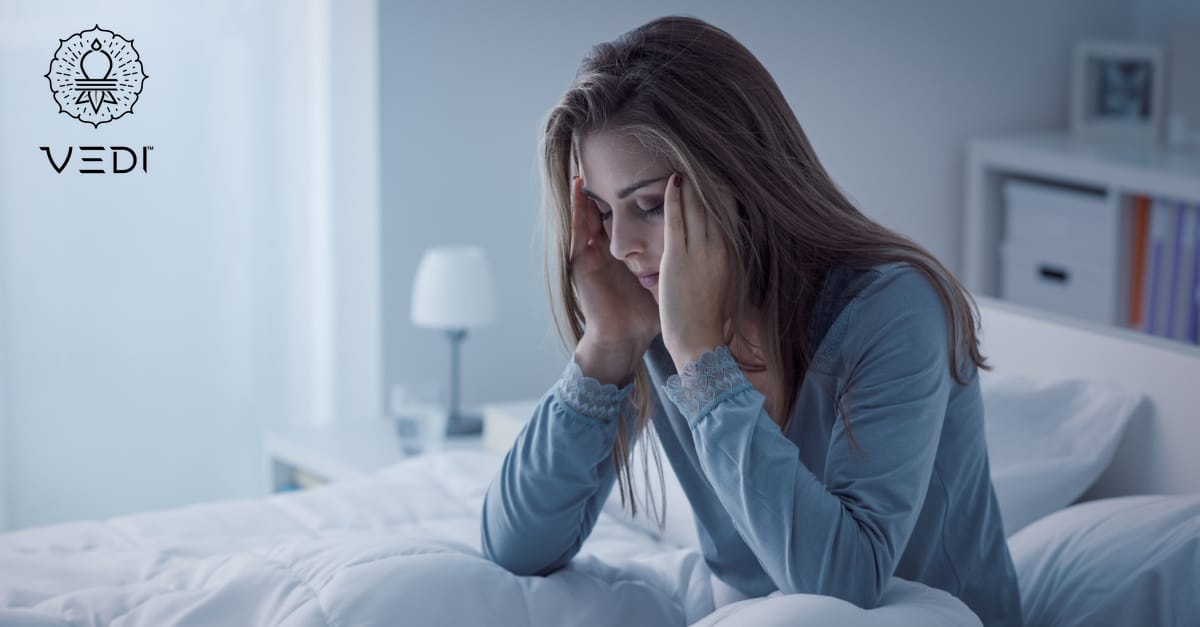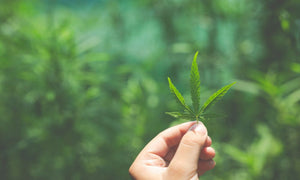Difficulty Sleeping? Try these Ayurvedic Tips

“त्रयउपस्तंभाइत्याहार: स्वपनोब्रम्हचर्यमिति | च. सू. ११/३५”
Ayurveda believes that wellness is dependent on three pillars, diet (Ahara), sleep (Nidra), and balanced sex life (Brahmacharya). These pillars hold the key to life and hold the body together. Sleep is one pillar amongst the trio that restores our energy and revitalizes our body for the next day.
The word "natural sleep" at night is also known as Bhutadhatri, a Sanskrit word derived from ‘Bhuta’ meaning the physical body and ‘Dhatri’ meaning the mother. It indicates that sleep nourishes our body just as a mother nurtures her child.
Sleep is the time when the body works to repair and heal itself. The mind and emotions are also balanced through sleep. That’s what makes sleep so important!
Understanding Sleep Imbalances: The Impact of Dosha Imbalances on Restful Sleep
There are majorly three types of sleep imbalances, caused by Dosha imbalances. Let us dive deep into each separately based on the Dosha type.
1. Vata Sleep Imbalance - It occurs when the mind is full of useful and useless thoughts. A cluttered mind cannot feel detached and rest peacefully.
Even if you fall asleep, it will be disturbed or light sleep, and you will wake up tired. Those having Vata dosha imbalance are prone to such sleep disorders.
2. Pitta Sleep Imbalance- It occurs when you can sleep at night, but the sleep cycle breaks at night and it is difficult to fall back asleep.
People who have undergone an emotional trauma or accident in their lives or people with imbalanced Pitta suffer from this sleep disorder.
3. Kapha Sleep Imbalance- It occurs when a person sleeps well the whole night but still wakes up drained and exhausted. The same dull and lethargic feeling continues throughout the day.
Such a disorder is common in those who have Kapha dominant characteristics.
How to Overcome Vata Sleep Imbalance?
- Eat foods to balance Vata Dosha. Vata characteristics are cool, light, dry, and rough. So, one should eat foods that neutralize these qualities to help balance excess Vata. Choose foods that are warm, moist, oily, smooth and nourishing.
- Massage with oil is always beneficial, in the morning and night.
- Relax your mind and body by yoga and meditation, especially before bed.
- Eat three regular meals, all warm and freshly cooked, having the biggest portion in the afternoon. Try to eat dinner by 7:00 p.m., so that there is enough time to digest the food before bed.
- Go to bed by 10:00 pm and wake up by 6:00 am.
How to Overcome Pitta Sleep Imbalance?
- Eat foods to balance the aggravated Pitta. The Pitta-pacifying diet involves eating more sweet, bitter and astringent foods. Eat more sweet and juicy fruits. While Ayurveda recommends cooked food instead of raw foods.
- Skipping or delaying meals should be avoided. Don’t starve! Eat a good evening meal, so you don't feel hungry before bed.
- Using aromatic Pitta cooling oil before bedtime.
- Avoid getting overheated while exercising. Prefer cooling sports, like swimming, skiing, hiking (not in the sun) or just walks.
- Sleep before 10 pm and wake up before 6:00 a.m.
How to Overcome Kapha Sleep Imbalance?
- Eat Kapha balancing food. Decrease the consumption of caffeine. Instead, opt for green tea, lemon or ginger tea. This will reinforce the body, and remove Ama. Avoid desserts, especially heavy, cold sweets such as ice creams and shakes.
- Kapha dominant people require rigorous exercise, and the best time to exercise in the morning (6:00 a.m. to 10:00 a.m.). Perform Pranayam (Breathing exercises) regularly.
- Rise before 6:00 a.m. Sleeping past Kapha time (6:00-10:00 a.m.) may cause Ama (toxins) to accumulate.
Herbal Remedies for Sleep Disorders: Ayurvedic Solutions for Better Rest
If you find that the above-mentioned practices are not helping you enough, you may consult an Ayurvedic Doctor at Vedi Herbals and try some of the herbal remedies.
Enhance Sleep with Vijaya 2:1 Cannabis
Vijaya 2:1 Cannabis has been used since ancient; times in Ayurveda as a sleep aid. Cannabis has been proven to shorten the time it takes to fall asleep, lengthen deep sleep time, relieve anxiety, and reduce pain, which together help in promoting sleep.
Vedi offers full-spectrum cannabis extract that is standardized to 4% CBD and 2% THC ( CBD: THC 2:1); which is very effective in improving sleep quality and duration. To know more, read the blog, Use Cannabis to improve sleep.
Relieve Insomnia & Hypertension with Sarpagandha Ghanvati
Sarpagandha Ghanvati; is an amazing natural medicine that helps treat insomnia due to hypertension. Sarpagandha is the main ingredient in Sarpagandha ghanvati which has valuable therapeutic actions, for the treatment of hypertension and psychotic disorders like schizophrenia, anxiety, epilepsy, insomnia, and insanity.
It is also used as a sedative and a hypnotic drug. Reserpine, the main active constituent of Sarpagandha has anti-hypersensitivity and tranquilizing properties.
This multi-herbal concentrate is available in tablet form, as Sarpagandha ghanvati. Cannabis-infused Sarpagandha is a boon for patients suffering from sleep disorders due to hypertension.
Boost Sleep & Reduce Stress with Ashwagandha
Ashwagandha (Withaniasomnifera) commonly known as Indian ginseng or winter cherry, is an ancient Ayurvedic super herb. The cooling effects of Ashwagandha on the nervous system help to treat anxiety, insomnia, and even ADHD.
Not just for sleep, it acts as a natural stress booster, which rejuvenates, and produces energy that helps the body to ease stress. A powerful adaptogen, Ashwagandha normalizes physiological functions.
It also acts as a natural stress buster and helps to reduce drowsiness. Read more about Ashwagandha here and how to take it here.







